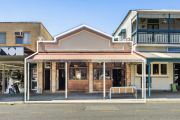
Rich Listers double down on industrial with $800m logistics plans
Rich Listers Andrew and Michael Buxton have doubled down on their conviction about the longevity of the industrial property boom after accumulating a 77ha landholding in Melbourne’s south-east with plans for an $800 million logistics estate.
The brothers’ $17 billion development juggernaut MAB Corporation acquired the final 32.5ha portion of the amalgamated site at 1520 Thompson Road in Cranbourne East this week, after agreeing to pay syndicator Fawkner Property more than $50 million for a former Nubrik quarry.
In total, MAB has spent close to $150 million putting the site together over the past two years.

The developer’s 1500ha industrial and commercial land bank – most of which is in Melbourne – is one of the largest in the country.
MAB chief executive David Hall said the landholding in Cranbourne gave it a strong presence in a key industrial node in Melbourne’s south-east to complement its already “embedded presence” in the north (including a newly launched $1 billion estate at Tullamarine near Melbourne Airport) and in the west.
“The [industrial] property market has softened slightly, after it had peaked very strongly. It’s still a strong market,” Mr Hall told The Australian Financial Review.
“If you own land that’s well located – wherever in the cycle you are – people will still want to do business with you. Good sites will sustain themselves through the cycle.”
Mr Hall said MAB was not reweighting its portfolio away from residential with plans under way for a major housing estate in Devon Meadows, a 32ha farming site in the south-east it purchased in 2020 for $37 million. Housing is also a big component of its giant Merrifield mixed-use estate in the city’s north.
But he said industrial development was a “more consistent business that was cushioned from the ups and downs of market cycles”.
The Cranbourne site lies within the Croskell Precinct Structure Plan – a 317ha commercial and residential hub, 40 kilometres south-east of the Melbourne CBD – that is due to be signed off by the state government next year.
Croskell is surrounded by established residential suburbs that are expected to drive demand for last mile logistics facilities and smaller warehouses and offices that MAB hopes to develop within its Cranbourne holding.
Jamie Buxton, MAB’s general manager of commercial and industrial, said the future Cranbourne estate would ultimately comprise over 250,000 square metres of industrial and logistics space with an end value exceeding $800 million.
“The development will have the benefit of established infrastructure including an already duplicated Thompsons Road, proximity to the future Dandenong South intermodal terminal, established Cranbourne West and Dandenong industrial precincts, multiple retail centres and a booming residential catchment,” Mr Buxton said.

Other major developers with nearby holdings include Salta, ESR, ISPT and Frasers.
On the vendor side, the sale of 1520 Thompsons Road represented a major windfall for fund manager Fawkner Property, which paid just $3.3 million for the property in 2007. (Fawkner struck a deal this month to buy a mall in Townsville from Dexus for more than $200 million.)
“It was always our intention to hold on to the land and achieve full value to provide capital gains for our investors, so this transaction is a terrific result for our unit holders,” said Fawkner founder and chief investment officer Chris Garnaut.
LAWD’s Peter Sagar, Paul Callanan and Henry Sayers brokered the sale. The real estate firm has sold more than $300 million of commercial land in the Croskell precinct.
Driving these sales, Mr Sagar said, was a rise in online shopping, which has increased the need for logistics and supply chain businesses.
“We are seeing a real shift, fast-tracked by COVID, where retail shopping has morphed into warehouse-based businesses selling products online and using logistics and supply chains to deliver to customers, rather than people shopping in a traditional storefront,” Mr Sagar said.
“For MAB, the Cranbourne acquisition creates a large institutional scale holding for them in an area where the supply of industrial land is largely exhausted.”











